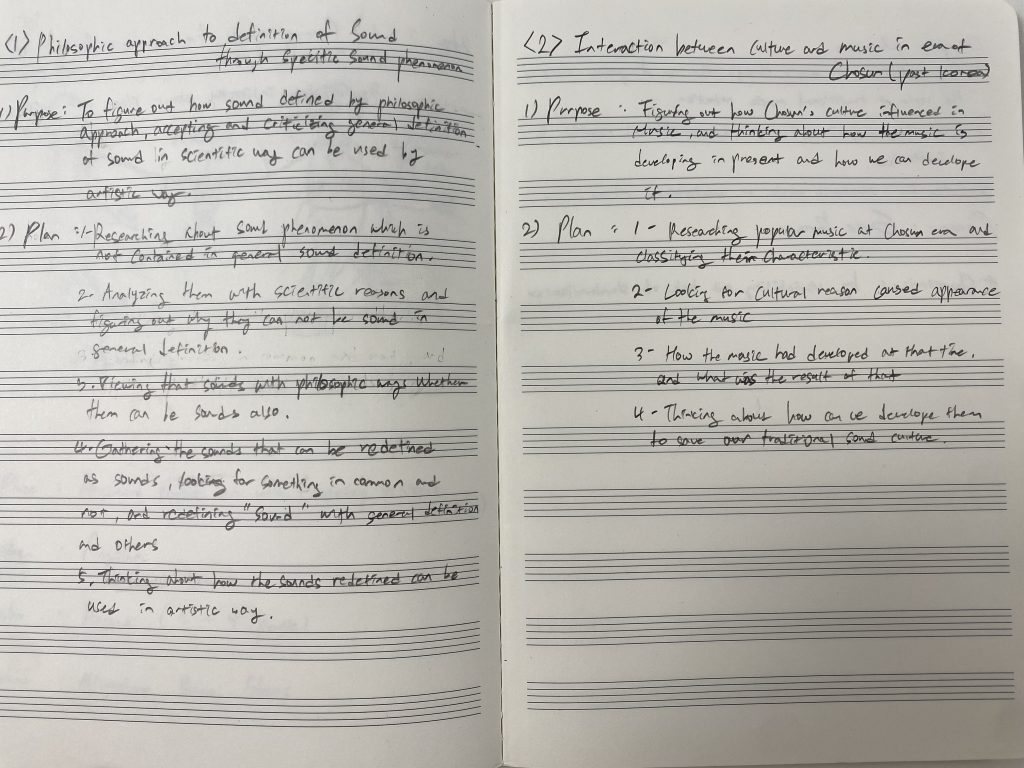We were tasked with crafting an essay on Global Sonic Culture, accompanied by four briefs to guide our exploration. Contemplating potential avenues for research and writing, two distinct ideas emerged. In this discourse, I will delineate a purpose and preliminary plan for both topics, comparing them to discern the one I would prefer to delve into further.

The initial topic centers on ‘A Philosophical Approach of Sound Definition Through Various Auditory Cases (e.g., tinnitus, deafness, ultrasound).’ The conventional definition of sound encapsulates it as ‘the waves produced by object vibration, resonating in and perceived by the ear,’. However, sometimes we hear sounds in the absence of physical vibrations, such as in auditory hallucinations or tinnitus, or sometimes we don’t hear sounds in the presence of physical vibrations, such as infrasound or ultrasound, which challenges conventional definition. Thus, I propose a philosophical inquiry into sound, aiming to critique and expand upon existing scientific delineations. The outlined research plan entails:
- Examining established sound definitions while cataloging instances that defy conventional criteria.
- Investigating the origins of these atypical sound phenomena and their divergence from physical paradigms.
- Exploring alternative philosophical frameworks to conceptualize these phenomena as sound.
- After summarising the commonalities or differences between phenomena that can be defined as sound from a philosophical approach, we will define sound through a dialectical argument with existing definitions of sound.
- Reflecting on the implications of this redefinition on artistic praxis.
This topic offers an opportunity to delve into philosophical logic and thinking, enriching future inquiries. However, the expansive nature of philosophy implies a potential lack of definitive conclusions, necessitating a focused approach.
The second topic delves into ‘The Interplay of Culture and Music in the Joseon Dynasty.’ Against the backdrop of Japanese colonization and subsequent Western cultural influences, Korean traditional arts, including music, faced suppression. This topic seeks to explore the cultural milieu of the Joseon Dynasty and its impact on music, alongside contemporary reflections on traditional music’s evolution and future trajectory. The proposed research plan encompasses:
- Identification and analysis of representative music from the Joseon Dynasty, elucidating its defining characteristics.
- Identify and summarise the cultural reasons for the emergence of such music.
- Tracing the developmental trajectory of Joseon-era music and its contemporary situation.
- Reflections on the modern evolution of Korean traditional music and strategies for its continued enrichment.
This topic promises insights into the symbiotic relationship between culture and music, particularly within the Korean context, offering avenues for personal artistic growth and future application.
While my inclination leans towards the first topic, given its philosophical depth, I acknowledge the value of pursuing the second topic within the course’s context, offering a concrete and contextually relevant exploration. Nonetheless, I anticipate revisiting the first topic as my philosophical understanding matures, aiming to glean deeper insights in the future.